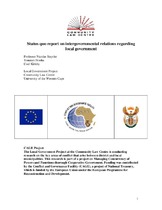Status quo report on intergovernmental relations regarding local government
Abstract
Local government in South Africa is a unique experiment in intergovernmental relations. Guided by the constitutional principle of co-operative government, the provinces, and district and local municipalities must work together to achieve their, often overlapping, goals. Key for local government is the delivery of basic services, such as water and housing, enshrined in the Bill of Rights. These government actors must coordinate common policies, programmes and delivery with each other. Since municipalities were created in 2000, a myriad of informal channels and forums have developed to align and inform each actor of the others’ desires and needs. Five years later, the current state of intergovernmental relations is fraught with confusion and misunderstanding.
The Intergovernmental Relation Framework Act (IRFA) came into effect on 15 August 2005. This Act formalizes the relations between (and within) the three spheres of government. Many of the proposed forums already exist in name or practice, or both. The IRFA’s ultimate goal is to enhance intergovernmental co-operation, which is a necessary precondition of realizing the goals of the Constitution: especially the effective delivery of basic human rights.
The object of this study is to canvas the evolution of intergovernmental structures, both provincial-local and intra-local, up to the date the IRFA was enacted. By analyzing the powers and function of these forums and how they have worked in practice, we will create a comprehensive picture of intergovernmental relations in South Africa. This study will serve as a benchmark against which to measure the success of the IRFA, in particular its nascent forums and their legislated activities. The report further establishes a set of criteria to evaluate the success (or failure) of IRFA forums in achieving the goals of cooperative governance.

